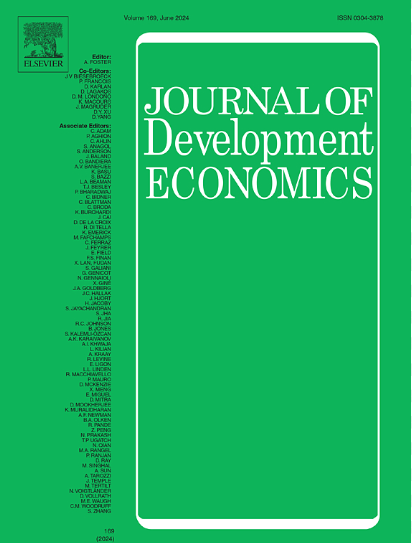High temperature, power rationing, and firm performance
IF 4.6
1区 经济学
Q1 ECONOMICS
引用次数: 0
Abstract
This paper develops a theoretical framework and provides causal evidence explaining the rationality of government-imposed power rationing strategies during high-temperature periods in electricity systems lacking market mechanisms and price signals. By combining comprehensive panel data on Chinese firms with high-resolution meteorological data, we document robust evidence that high temperatures significantly reduce both electricity usage and operational performance among firms. We then construct supply shocks based on precipitation anomalies weighted by the inter-provincial hydropower dependence to identify power rationing. These analyses demonstrate the persistent prevalence of firm-level power rationing across China in recent years. Furthermore, we show that while redirecting electricity from industrial to residential sectors during heat-induced shortages reduces firm performance, this represents a welfare-maximizing outcome from a social planner's perspective. Our findings reveal how climate change intensifies inter-sectoral electricity competition, with market inefficiencies playing a critical role in explaining China's rationing patterns.
耐高温,限电,性能稳固
本文建立了一个理论框架,并提供了因果证据来解释在缺乏市场机制和价格信号的电力系统中,政府在高温时期实施限电策略的合理性。通过将中国企业的综合面板数据与高分辨率气象数据相结合,我们记录了强有力的证据,表明高温显著降低了企业的用电量和运营绩效。然后,我们基于降水异常、省际水电依赖加权构建供应冲击,以确定电力配给。这些分析表明,近年来,企业层面的限电在中国持续盛行。此外,我们表明,虽然在热短缺期间将电力从工业部门转移到住宅部门会降低企业绩效,但从社会规划者的角度来看,这代表了福利最大化的结果。我们的研究结果揭示了气候变化如何加剧部门间的电力竞争,而市场效率低下在解释中国的配额制模式方面发挥了关键作用。
本文章由计算机程序翻译,如有差异,请以英文原文为准。
求助全文
约1分钟内获得全文
求助全文
来源期刊

Journal of Development Economics
ECONOMICS-
CiteScore
8.30
自引率
4.00%
发文量
126
审稿时长
72 days
期刊介绍:
The Journal of Development Economics publishes papers relating to all aspects of economic development - from immediate policy concerns to structural problems of underdevelopment. The emphasis is on quantitative or analytical work, which is relevant as well as intellectually stimulating.
 求助内容:
求助内容: 应助结果提醒方式:
应助结果提醒方式:


